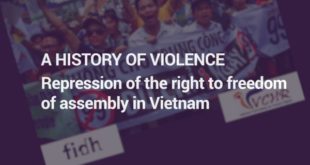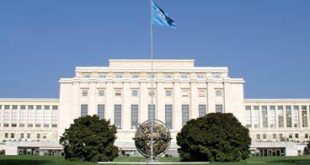INSTITUTE OF THE SANGHA
| Buddhist Era 2555 |
Ref. : TĐPĐ/VTT
|
Anniversary of the Birth of Buddha, Buddhist Era 2555
by the Most Venerable THICH QUANG DO
Supreme Patriarch of the Unified Buddhist Church of Vietnam
Blessed be Lord Sakyamuni Buddha!
On behalf of the Bicameral Council of Institutes of the Unified Buddhist Church of Vietnam, I extend my warmest regards to all respected dignitaries, monks, nuns and Buddhists at home and abroad on this Day of the Vesak. We pledge to strive harder to spread Lord Buddha’s teachings and bring good to humankind, to change the tragic situation of our country and to fulfill the sacred mission of Buddhism on our earth.
This year’s Vesak bears two important meanings for our world and humanity. Both emanate from the United Nations, the largest global forum of states. In his Message to the 8th United Nations Day of the Vesak celebrations in Thailand under the theme of “Socio-economic Development”, U.N. Secretary General Ban Ki Moon declared:
“Your chosen theme of socio-economic development may sound modern, but its core is the very problem of human suffering that Siddharta Gautama sought to address more than 2,500 years ago when he left his palace, relinquished his worldly possessions and went out into the world. (…) His injunction against the three poisons of greed, anger and ignorance can animate multilateral discussions on the hunger that needlessly affects nearly a billion people in our world of plenty, the brutal violence that takes millions of lives each year, and the senseless environmental damage that humans cause to our only home, the planet earth. Numerous Buddhist organizations are putting these teachings into practice. I am deeply grateful to their support to achieve United Nations Millennium Development goals, our blue-print for tackling the major socio-economic challenges facing our world”.
The first important meaning we can draw from this Message is that, in the midst of the ideological and political crisis that is shaking our world, manifested by an escalation of dictatorship and terrorism, the United Nation has recognized the Buddhist teachings of compassion, tolerance and peace as a lifeline that can help solve the problems of human suffering.
The second meaning, no less important for religious followers in Vietnam, is that this year, the United Nations celebrates the 30th Anniversary of the Declaration on the Elimination of All forms of Discrimination based on Religion and Belief. More than anyone else in Vietnam, UBCV Buddhists are the foremost victims of discrimination and violations of human rights that has continued unabated over the past 36 years.
Throughout 2,000 years of Vietnamese history, Buddhists have faced continuous tragedy and suffering, foreign aggression and social injustice. But they have always engaged actively to overcome these scourges, working in harmony with ruling dynasties that truly cared for the people. But today, this harmony has been lost, perverted by a conflict of alien ideologies that have invaded our people’s minds. It was for this reason that we Buddhists, for the very first time in our history, took to the streets in the 1960s to defend the values and ethics inherent in Eastern thinking from the aggressive invasion of a foreign doctrine that had was alienating our people and society.
This struggle against alien ideologies continues today. As we embark upon the 21st Century, Vietnam lives under a regime guided by an imposed, alien ideology that has driven our people to fratricidal war, crippled our economy and ruined our society. Our aim, as Buddhists, is to oppose this by pressing the government to make concrete reforms. The leadership must cease arbitrary practices and put an end to policies which exist only on paper, but do nothing to bring prosperity, happiness and freedom to the people of Vietnam.
Buddhist philosophy promotes the ideal of social equality in every domain, such as culture, economy and politics. Never has Buddhism advanced any anti-social teachings, and this is why, though time immemorial, Vietnamese Buddhists have unswervingly engaged to respect and promote human rights. We resolutely oppose social injustice and inequality, for they are the root cause of discrimination and the brutal suppression of our people’s rights. Today, Buddhists are prevented from freely practicing their beliefs, prohibited from realizing the Boddhisattva’s vows of Compassion, Wisdom and Determination to alleviate human suffering, and denied the right to strive to attain Buddhism’s ultimate goal – enlightenment.
From this guiding principle of liberating beings from suffering, Vietnamese Buddhism has devised countless positive initiatives to defend our people and country. The 2,000-year history of Vietnamese Buddhism, linked inextricably to that of our people, has demonstrated repeatedly that the principles of Defending the People, Defending the Nation and Defending the Dharma are indivisible and mutually reinforcing. They are the inspiration and lodestar of the lifestyle and actions of all Buddhists in Vietnam.
Vietnam has suffered from one hundred years of colonization, sixty five years of fratricidal war and authoritarian rule. It is time for Buddhists to take their destiny in hand. We can no longer stand idle, blame our sufferings on destiny or put things off until the next life. We must follow the example of Emperor Asoka by transcending violence, nurturing compassion and developing wisdom. In this way, we can follow the Path that Lord Buddha walked upon 2,555 years ago.
This is the most meaningful way to remember Lord Buddha and pay our debt of gratitude to him on this sacred Vesak Day.
Buddhist Era 2555, 2011 AEC
Fifth Supreme Patriarch of the Unified Buddhist Church of Vietnam
(Signature and Seal)
Sramana THICH QUANG DO
 Quê Me Quê Me: Action for democracy in Vietnam & Vietnam Committee on Human Rights
Quê Me Quê Me: Action for democracy in Vietnam & Vietnam Committee on Human Rights


